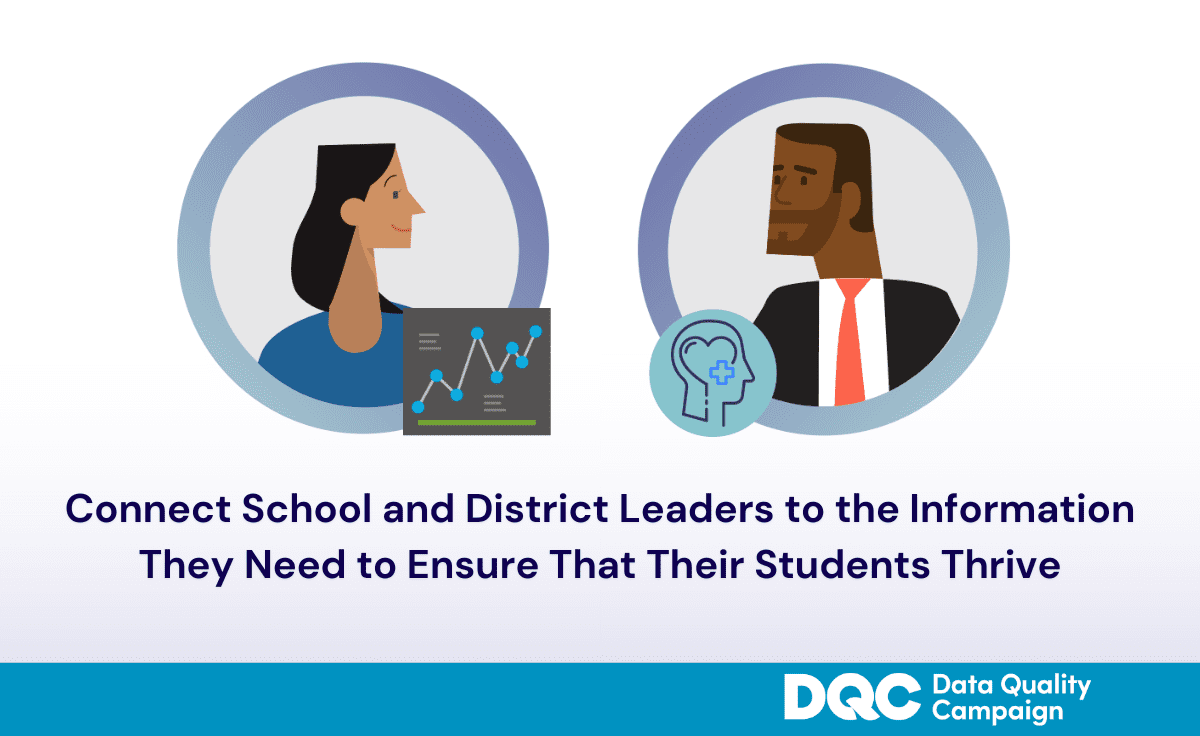New Data Quality Campaign use case addresses how states can connect school and district leaders to the information they need to ensure that their students thrive.
WASHINGTON (September 24, 2024) –Students navigating their K–12 education need in- and out-of-school support to meet their academic and nonacademic needs. To provide this comprehensive academic and social support, district and school leaders need access to information for decisionmaking. But right now, state data systems provide insufficient access to the data that helps individuals, the public, and policymakers answer their questions and make decisions.
The Data Quality Campaign’s (DQC) latest resource, Use Case: Connect School and District Leaders to the Information They Need to Ensure That Their Students Thrive, highlights what is possible for K–12 education leaders when they have access to data. From identifying students who need additional support, to facilitating and delivering student and family access to services, to advocating for the expansion of access to academic, economic, and social supports—district and school leaders need data to effectively support students. This resource builds on DQC’s vision to reimagine the future of statewide longitudinal data systems (SLDSs) that connect individual-level data from early childhood, K–12, postsecondary, and the workforce to ensure that everyone has access to the information they need to navigate education and workforce.
“Students need support to help them through their K–12 education journeys,” said DQC President and CEO Jennifer Bell-Ellwanger. “States have the opportunity to transform their SLDSs to help leaders connect students and families to wraparound services like out-of-school academic support or SNAP benefits to keep students healthy and on track.”
But the need for data doesn’t stop at school and district leaders:
- School-based support staff need access to data to help students and their families identify, assess their eligibility for, and enroll in public benefits programs; refer and enroll students into appropriate support programs; monitor changes in eligibility or enrollment for various services; and coordinate with external state agency staff to facilitate services for students and families.
- The public needs access to data to hold the government accountable for providing access to services that students and families need to thrive; identify and learn from areas of promising growth in supporting student needs; and answer questions about different school-based youth programs and their impact on long-term outcomes.
- Policymakers need access to data to answer questions such as:
- How do school-based support services and programs affect comprehensive student growth?
- What health care services do students have access to in schools and how can states assist in providing additional health care services to fill in gaps?
- Which support services and out-of-school programs should have additional resources directed toward them to account for increased demand and positive outcomes?
View the full report, including examples of states already beginning this work, here.
Read DQC’s full vision, which includes information on various data users and their needs, four other use cases that show what’s possible when SLDSs provide tailored access to individual-level data, and recommendations for state and federal leaders to make this vision a reality.
###
The Data Quality Campaign is a nonprofit policy and advocacy organization leading the effort to ensure that data works for everyone navigating their education and workforce journeys. For more information, go to dataqualitycampaign.org and follow us on LinkedIn and Twitter.


